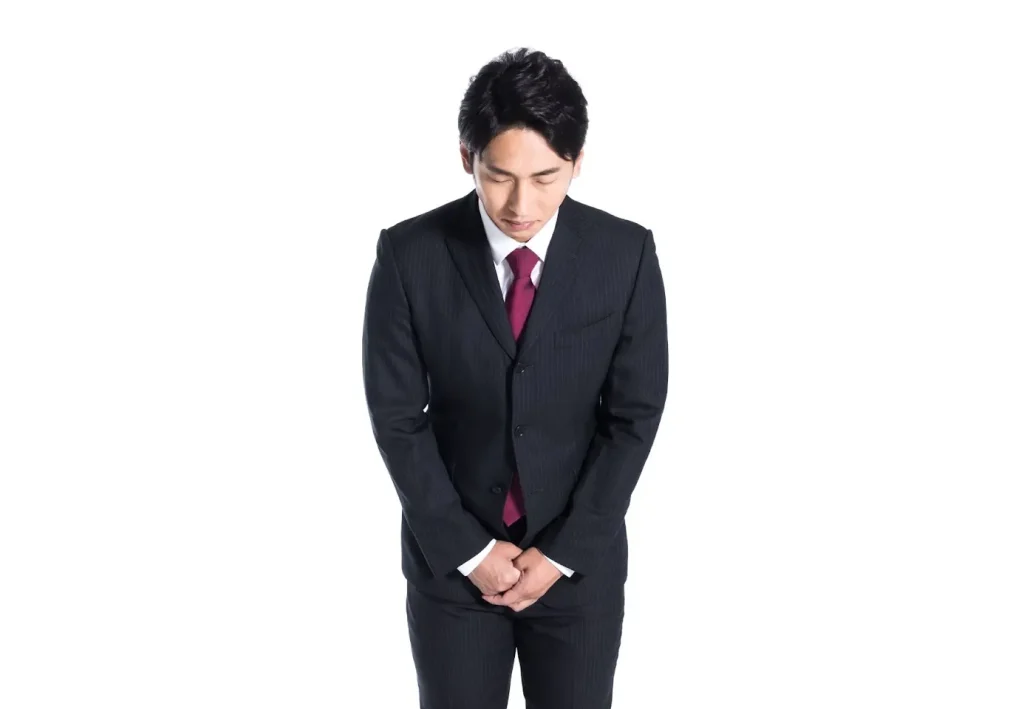What does the Japanese word "Sumimasen" mean? Explanation of business usage and example sentences

Japanese people use "sumimasen" (sorry) or "doumo sumimasen" (thank you) in various situations, such as when apologizing, calling a waiter, or making a request.
For foreigners studying Japanese, the question is, "Why did you apologize just now?" "Wasn't that just a thank you?" I am sure that many foreigners studying Japanese wonder "Why did you apologize just now?
So, in this article, we will explain the meaning, usage, and pronunciation of "excuse me" in detail.
At the end of the article, you will actually learn how to use "excuse me" with example sentences. Let's master "excuse me" and become able to speak natural Japanese!
▼Goandup Picks Click here for recommended articles!
- Required before studying abroad! Goandup Nihongo+, an online Japanese language learning service
- This page introduces services for foreigners who wish to study in Japan or improve their Japanese language skills to learn Japanese online.
- Goandup Salon" community for foreigners living in Japan
- We introduce an online community where foreigners living in Japan can exchange information and interact with each other to support their life in Japan.
- Goandup Study" supports foreigners who want to study in Japan.
- This section introduces study abroad support services that provide comprehensive support to foreigners who wish to study in Japan, from preparation for study abroad to living in Japan.
- Where can I buy a prepaid SIM in Japan? Recommended SIM cards for foreigners are also introduced.
- How to purchase a prepaid SIM and suitable SIM cards for foreigners.
- The Complete Guide to Pocket Wi-Fi in Japan for Foreigners!
- We introduce how to select and recommend pocket Wi-Fi products that can be used conveniently in Japan.
- The Complete Guide to Finding a Job in Japan! Finding a job, changing jobs, and part-time work for foreigners
- This site provides foreigners who want to work in Japan with comprehensive information on how to find a job, recommended job sites, and other information necessary to find a job.
Three meanings of "excuse me

Sumimasen" commonly used by Japanese people has three major meanings.
- Sorry (apology)
- Thank you (Appreciation)
- May I have a word?
Meaning of "excuse me" (1) I'm sorry (apology)
The literal translation of "excuse me" is "I'm sorry.
When you bump into someone on the street or are late for a meeting, "excuse me" is an apology.
Attention! Attention!
Sorry is used only for small mistakes or failures.
If you have made a serious mistake or error, use "I'm sorry" instead of "I'm sorry.
Meaning of "excuse me" (2) Thank you (gratitude)
The word "excuse me" also means "thank you."
When someone picks up a lost item or gives you a souvenir, "excuse me" expresses gratitude.
Meaning of "excuse me" (3) May I have a word?
Excuse me" can be used in the same way as "um-ou," which is used to call someone off.
When you want to ask for directions, ask where something is for sale at the supermarket, or order at a restaurant, you must first call out "excuse me" before speaking.
Other
Other times, "excuse me" is used to get attention or to ask for a favor.
Especially when asking for a favor, "Excuse me, could you do me a favor? Just putting "excuse me" in front of the request will give a good impression.
English equivalent of Japanese "Sumimasen

The English translation of "excuse me" changes for each scene.
- I'm sorry.
- Thank you.
- Excuse me.
- Can you (do) 〜 ?
【 apology 】I'm sorry.
Sorry applies to the mildest (less serious) of apologies.
The literal translation of "I'm sorry." can also be translated into English as "Pardon me?", "I beg your pardon.", or "My bad.
【hank you 】Thank you.
Excuse me" has the meaning of gratitude and can be translated into English as "Thank you.
Other English translations include "Thank you for~" and "Thanks!
【 call 】Excuse me.
Excuse me." when speaking to a waiter can be translated into English as "Excuse me.
【 Please 】Can you (do) ~ ?
Excuse me, can you do me a favor? When you want to ask for something, you can translate it into English as "Can you (do) 〜 ? can be translated into English as "Can you (do) 〜 ?
The difference between "excuse me" and "sorry" and what to look out for in business

Have you ever heard Japanese people say "suimasen"? The word "suimasen" is a variant of "sumimasen" that is easier to pronounce. In addition to "suimasen," there are other expressions such as "sunmasen" depending on the region.
Both are colloquialisms used only in spoken language, so use "excuse me" when using them in writing or in e-mails. In addition, "suzumasu" is more frank than "sumimasen". The correct wording is "sumimasen" (sorry).
Foreigners who are studying Japanese should consciously use "excuse me". Especially when apologizing, it is more impressive to use "excuse me" instead of "sorry.
However, in business situations, instead of using "excuse me," it is required to use appropriate honorifics according to the situation, such as "I am sorry," to apologize, "thank you," to express gratitude, and "I beg your pardon," to make a request.
【 by meaning 】 "I'm sorry" usage and example sentences

Now, let's actually learn how to use "excuse me".
1. "I'm sorry" as an apology
scene1 When you bump into someone on the street
| I'm sorry, 大丈夫? (大丈夫?) English translation: I'm sorry. ⇒大丈夫. (daijyoubu desuyo.) English translation: I'm all right. |
scene2 When you cannot answer the phone
| Sorry I couldn't answer the phone. (dennwani derarenakute sumimasen.) English translation: I'm sorry I didn't answer your call. |
scene3 When you are late for a meeting
| Sorry for the delay. (okuretesimai doumosumimasen.) English translation: I'm sorry for being late. |
2. thank you "excuse me
scene1 When you receive a souvenir
| This is a souvenir from Hokkaido. Please take it. (korewa hokkaido no omiyagedesu. douzo.) English translation: This is a little something I got for you from Hokkaido. ⇒ Wow! Thanks, sorry. I'm so happy. (I'm so glad. I'm so glad.) English translation: Thank you. |
scene2 When someone picks up a lost item
| Did you drop this? (kore otosimasitaka?) English translation: Did you drop this? ⇒Ah, sorry. (a, sumimasen.) English translation: Thank you. |
3. the invocation "excuse me
scene1 Calling a waiter in a restaurant
| Sorry. (sumimasen.) English translation: Excuse me. |
scene2 Asking for directions
| Excuse me, can you tell me the way to the library? (sumimasenga,tosyokaneno michinoriwo osiete itadakemasenka?) English translation: Excuse me, could you tell me the way to the library? |
scene3: When you want to ask someone to move out of the way on a crowded train, etc.
| Sorry, please let me through. (sumimasen,toositekudasai.) English translation: Excuse me. |
Serious employment support to help you realize your dream of working in Japan!

Do you want to work in Japan?
Let us "Goandup" make that dream a reality!
【 Program Features 】
✅ JLPT N3 level Japanese language acquisition
✅ Thorough preparation for the specific skills test
✅ Full support for job hunting in Japan
Business-focused one-on-one lessons will help you find a job in Japan in the shortest possible time.
【 Program Menu 】
- Individual Japanese language lessons
- Intensive curriculum to obtain N3, especially specialized lessons for business Japanese that can be used at work.
- Intensive curriculum to obtain N3, especially specialized lessons for business Japanese that can be used at work.
- Preparation for the Specific Skills Test
- Customized materials for specific skill tests will be used to focus on frequently asked questions and learning to pass the test.
- Customized materials for specific skill tests will be used to focus on frequently asked questions and learning to pass the test.
- Resume and CV support
- To create resumes and CVs tailored to Japanese corporate culture, and to brush up on self-promotion and motivation for application.
- To create resumes and CVs tailored to Japanese corporate culture, and to brush up on self-promotion and motivation for application.
- Interview Preparation
- Guidance on areas for improvement through mock interviews and feedback based on corporate interview scenarios. Learn interview etiquette and behavior unique to Japan.
- Guidance on areas for improvement through mock interviews and feedback based on corporate interview scenarios. Learn interview etiquette and behavior unique to Japan.
- career consulting
- Provide introductions to companies that match the participant's career goals, select companies to apply to, and provide advice on the level of knowledge required by the companies to which the participant is applying.
- Provide introductions to companies that match the participant's career goals, select companies to apply to, and provide advice on the level of knowledge required by the companies to which the participant is applying.
- Chat Support
- In addition to one-on-one individual lessons, we also accept casual questions via DM (visa application, living support, assistance in finding a room, etc.).
If you are serious about your career in Japan, join us now!
▶︎ for more informationclick here.
We will do our best to support your success in Japan!
summary
In this article, we have explained in detail the meaning and usage of "excuse me".
Sumimasen," which Japanese say many times a day, has many meanings other than "I'm sorry," including gratitude and a call to action.
It may seem a little complicated for foreigners, but once you get used to Japan, "Sumimasen" should come naturally.
Let's master "Sumimasen" and become able to speak natural Japanese!
Your support will help us!
Thank you for visiting Goandup Picks. Our mission is to provide you with more useful information to show the world what Japan has to offer.
Your support will help us to further enhance our activities, so please support us!






